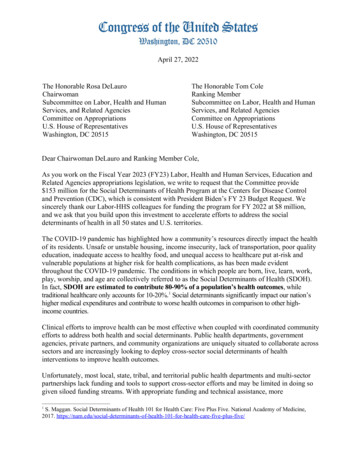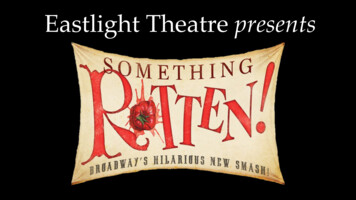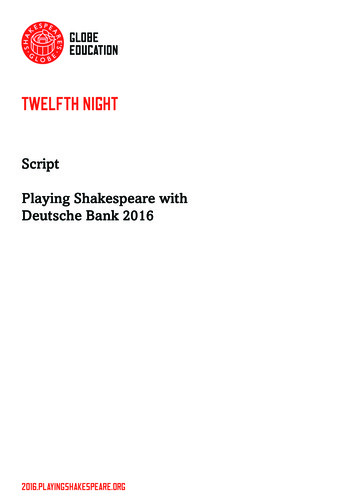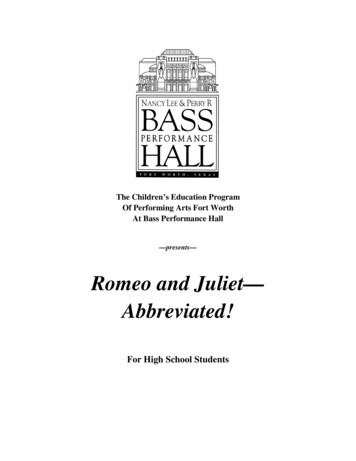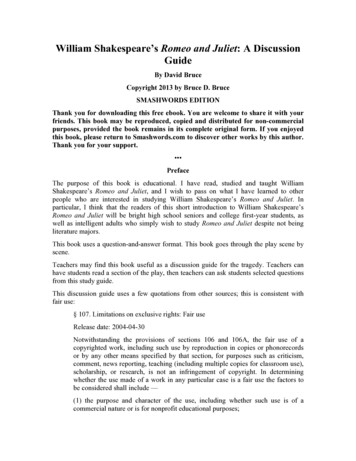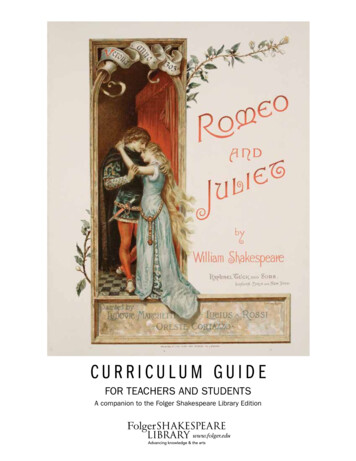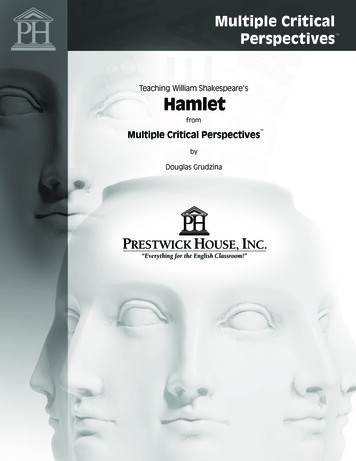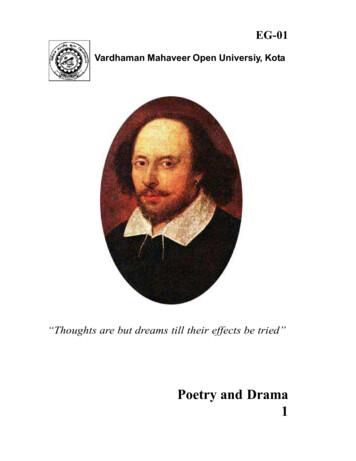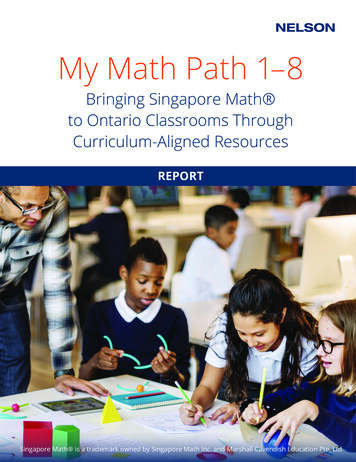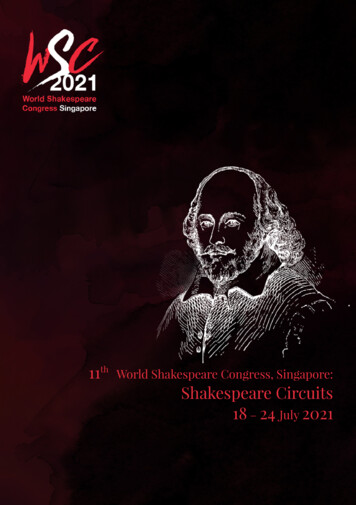
Transcription
11thWorld Shakespeare Congress, Singapore:Shakespeare Circuits18 – 24 July 2021
Held inSupported by
Members of the Local Organising Committee for theWorld ShakespeareCongress 2021Local CommitteeCo-Chair: YONG Li Lan (National University of Singapore, Singapore)Co-Chair: Bi-qi Beatrice LEI (National Taiwan University, Taiwan)Executive Director: Eleine NG-GAGNEUX (National University of Singapore, Singapore)Festival Director: LEE Hyon-u (Soonchunhyang University, South Korea)Deputy Festival Director: Alvin Eng Hui LIM (National University of Singapore, Singapore)Michael DOBSON (Shakespeare Institute, UK)Mika EGLINTON (Kobe City University of Foreign Studies, Japan)Emily SOON (Singapore Management University, Singapore)Programme CommitteeChair: Lena Cowen ORLIN (Georgetown University, USA)Tom BISHOP (University of Auckland, New Zealand)Ton HOENSELAARS (Universiteit Utrecht, Netherlands)Bi-qi Beatrice LEI (National Taiwan University, Taiwan)YONG Li Lan (National University of Singapore, Singapore)SecretariatRoweena YIP (National University of Singapore, Singapore)Jennifer HO Hui Lin (National University of Singapore, Singapore)Karen LAM Xue Ling (National University of Singapore, Singapore)DesignJIANG Liheng (FreeWave Media Pte Ltd, Singapore)
11th World Shakespeare Congress, Singapore: Shakespeare4
1WelcomeWhen I think back over the previous WSCs I have attended,I recall great experiences and wonderful programmes– but never a Congress quite as ambitious as this one.Thanks to the extraordinary work of our Local OrganisingCommittee, Singapore is bringing the Congress to theworld, ensuring that this is a global event for scholarshipand theatre on an unprecedented scale in its entirelyvirtual format, not least in the extraordinary riches of theDigital Asian Shakespeare Festival.Across the many sessions of the 2021 WSC we will shareour thoughts and discoveries, our research and creativity,our achievements past and our future plans. We do soalways discovering yet again that Shakespeare, even aswe so profoundly seek to rethink his place in the historyof cultures of oppression across the world, can still be asource of joy in our research, of the pleasures of our work– for what is our gathering if not a time of sharing whatdrives us and delights us?Of course, we cannot but be aware of the shadow ofthe pandemic. In the early days of its emergence, thenewspapers were full of pieces by Shakespeareansabout his having written King Lear while plague kept thetheatres closed and similar attempts to parallel plagueand pandemic. The parallels were never quite convincingenough. If it has done nothing else, the pandemic hasmade us differently conscious of our world. When I turnto the news, as I do many times a day, and I see whatis happening elsewhere, I think of Shakespeare scholarsacross the world who live in countries where the daily deathtoll is still horrifically high, where the precious vaccines arevirtually unobtainable, where the stress and distress ofliving in these times are taking their own uncounted toll.And I think of Shakespeare scholars we have lost to thevirus.
11th Shakespeare Congress, Singapore: Shakespeare CircuitsOur times have made us newly aware of the world andnewly aware of Shakespeare’s place within it. And it hasspawned new Shakespeare industries. I enjoyed wearingShakespeare facemasks I found online. No, they weren’tof the highest protective quality but I was cheered by onethat read ‘A plague on neither of your houses!’ or anotherthat encouraged my interlocutors to ‘Prithee, stand furtheroff’ or one that reminded those who looked at me that‘False heart doth hide what the false heart doth know’ –and it pleased the scholar in me that each identified theplay from which the quotation or misquotation came.Perhaps those facemasks will prove to be another of themyriad Shakespeare circuits that WSC 2021 is devotedto exploring, another channel through which his worksmove across times and place, across cultures and nations,across media and differing presences.So welcome to WSC 2021. And, as we begin to enjoy thefeast of the Congress program, my profound thanks to allthose who made this possible, especially the core group ofthe Local Organising Committee without whom none of thiscould ever have been possible.- Peter HOLLANDChair,International Shakespeare Association2
3World Shakespeare, Online from SingaporeWe are excited and proud to welcome you to the first online World Shakespeare Congress. Thisis the first Congress where communities of Shakespeare scholars, teachers and practitioners inover 40 countries will gather and interact while remaining each in our own locations, time zones,climates, and cultures for Shakespeare. Even as it appears that the global technology of videoconferencing and recordings flatten our differences, we are in fact even more situated, diverseand ‘local’ than we would be on site together as visitors in one city. By meeting online, we bringtogether all the places where we are. It is therefore with a remarkable effort of imagination,faith and joint purpose that we gather our ideas and interests in Shakespeare to record andlisten to papers in our own homes, and share online presence. Making time out of our normalschedules for a few hours, will, we hope, bring our lives more closely into the circuits by whichShakespeare still travels around the world.The Congress Programme Committee of Lena ORLIN, Ton HOENSELAARS and TomBISHOP have worked with us on an outstanding programme that explores the questions,new directions and fresh connections that are growing in Shakespeare studies. The DigitalAsian Shakespeare Festival directors LEE Hyon-u and Alvin Eng Hui LIM have curated tenperformances by renowned and emerging directors across East, South and Southeast Asia,(subtitled) performance recordings of which will be online from 5 – 27 July 2021. Watch partiesand In-Conversation sessions with the directors provide a special opportunity to understandhow and why Asian practitioners bring Shakespeare onto their own stages.Instead of cramming as much as we can into a week, we have re-drawn the timeframe ofthe Congress for the online medium across time-zones. There is a pre-Congress period (1 –17 July) where video-recordings of panel papers and performances will be online for viewing,and where we will also host watch parties with the directors of the performances. The mainCongress period (18 – 24 July) will bring us together live for the plenary sessions of keynotes,roundtables and conversations with directors, as well as Q&A sessions for the panels. The postCongress period (25 July – June 2022) will continue to provide access to the paper and sessionrecordings.While of course we regret not being able to welcome everyone into Singapore, we are able topresent many more performances than we could stage live, and delegates who would not havebeen able to make the trip here can now join our community. We send you tea from Singapore,commissioned for WSC 2021 with the theme of the Clipper Route’s global passage, and inviteyou to share a cup of tea together as we meet online.- YONG Li Lan and Bi-qi Beatrice LEICo-Chairs,Local Organising Committee of the 2021 WSC
11th Shakespeare Congress, Singapore: Shakespeare Circuits4Welcome to the Digital Asian Shakespeare Festival!This virtual Festival celebrates the setting of this year’s World Shakespeare Congress inSingapore by bringing together screenings of Asian performances, curated watch parties,dialogue sessions with practitioners, and a digital tour, Shakespeare & Singapore, 1840-2000.The performances will encompass a wide range of representative Asian Shakespeare worksfrom the traditional to the most innovative. Selected as windows into Asian aesthetics, theperformances will illustrate how diverse, creative, and unique Shakespearean interpretationscan emerge from aesthetic practices that remain deeply rooted in Asian religious rituals,traditional culture, and philosophy. The directors of the performances, including WU Hsing-kuo(Taiwan), TANG Shu-wing (Hong Kong), Annette LEDAY (France), Nelson CHIA (Singapore),and YANG Jung-Ung (South Korea) will also meet with delegates in interactive online sessions.The Digital Asian Shakespeare Festival will offer rare opportunities for delegates to enjoy thediversity and the depth of Asian Shakespeare while breaking through the barrier of the COVIDpandemic.- LEE Hyon-uFestival Director,Local Organising Committee of the 2021 WSC
5About the ISAThe International Shakespeare Association (ISA) was created in 1974 as an umbrella organisationto connect Shakespearians and Shakespeare societies across the globe. With its headquartersat the Shakespeare Birthplace Trust, a small committee of prominent Shakespearians, includingJohn Russell BROWN, O. B. HARRISON, George HIBBARD, and Levi FOX, helped shapethe association’s original objectives, including advising on the initiation and planning of WorldShakespeare Congresses. The original executive committee, like all committees since, wasmade up of representatives from around the world.The first ISA World Shakespeare Congress took place in Washington in 1976 as part of theAmerican bicentennial celebrations. Since the Washington meeting, the ISA has continued tostage World Congresses at five-year intervals: ‘Shakespeare, Man of the Theatre’ (Stratfordupon-Avon, 1981); ‘Images of Shakespeare’ (Berlin, 1986); ‘Shakespeare and CulturalTraditions’ (Tokyo, 1991); ‘Shakespeare and the Twentieth Century’ (Los Angeles, 1996);‘Shakespeare and the World/World Shakespeares’ (Brisbane,2006); ‘Renaissance Shakespeare:Shakespeare Renaissances’ (Prague,2011); and ‘Creating and n, 2016).The ISA offers an opportunity for individuals and institutions to join together to further the knowledgeof Shakespeare throughout the world. In 2015, the Association was formally registered as aCharitable Incorporated Organisation in Great Britain. The ISA’s central commitments are to advancethe education of the public by furthering the study of Shakespeare’s life and work, including by: Organising, holding and promoting participation in the World Shakespeare Congressand disseminating the learning from the event; Offering advice and assisting in the establishment of national or regionalShakespeare associations.
11th Shakespeare Congress, Singapore: Shakespeare CircuitsOfficers of the International Shakespeare AssociationPresident: Dame Judi DENCHChair: Peter HOLLAND (University of Notre Dame, USA)Vice Chair: Martin PROCHÁZKA (Charles University, Czech Republic)Executive Secretary & Treasurer: Nick WALTON (Shakespeare Birthplace Trust, UK)Membership Administrator: Paula WILKINSON (Shakespeare Birthplace Trust, UK)ISA Executive CommitteeTom BISHOP (University of Auckland, New Zealand)Clara CALVO (University of Murcia, Spain)Sukanta CHAUDURI (Jadavpur University, India)Rafik DARRAGI (University of Tunis, Tunisia)Carla DENTE (University of Pisa, Italy)Dominique GOY-BLANQUET (University of Picardie, France)HIROTA Atsuhiko (University of Kyoto, Japan)Ton HOENSELAARS (University of Utrecht, Netherlands)Peter HOLBROOK (University of Queensland, Australia)Bi-qi Beatrice LEI (National Taiwan University, Taiwan)Gordon MCMULLAN (King’s College London, UK)Alfredo Michel MODENESSI (National Autonomous University of Mexico, Mexico)Claudia OLK (Free University of Berlin, Germany)Lena Cowen ORLIN (Georgetown University, USA)Gary YANG (Donghua University, Shanghai)YONG Li Lan (National University of Singapore, Singapore)Honorary MembersWerner HABICHT (University of Wuerzburg, Germany)KISHI Tetsuo (Kyoto University, Japan)Jill LEVENSON (University of Toronto, Canada)Sir Stanley WELLS CBE (Shakespeare Birthplace Trust, UK)6
7About the HostA leading global university centred in Asia, the National University of Singapore (NUS) isSingapore's flagship university which offers a global approach to education and research witha focus on Asian perspectives and expertise. NUS enrols 38,000 students from more than100 countries across 17 faculties and three campuses, and forges partnerships aroundthe world. The National University of Singapore aspires to be a vital community of academics,researchers, staff, students and alumni working together in a spirit of innovation and enterprisefor a better world.
11th Shakespeare Congress, Singapore: Shakespeare Circuits8SponsorsSingapore Tourism BoardThe Singapore Exhibition & Convention Bureau (SECB) is a group of the Singapore TourismBoard that champions the business events industry in Singapore. As the lead governmentagency for this industry, SECB aims to establish Singapore as a dynamic business eventsdestination where an ecosystem of ideas, people, and technology draws on vibrant knowledgeand an extensive network.Held inSupported by
9SponsorsPek Sin ChoonPek Sin Choon Pte Ltd was founded and established by Mrs BaiZhuang Dan Niang (白-庄旦娘) and her son Mr Pek Kim Aw (白金讴)in 1925, the year of the Buffalo according to the Chinese Horoscope.During his time, Mr Pek Kim Aw was also known as ‘Buffalo Head’for his just and upright character. As such, the Buffalo became themascot of the company, as symbolised in the ‘Cowherd Boy on Buffalo’trademark.Today, Pek Sin Choon Pte Ltd has positioned itself as a supplier of premium Chinese Tea that isblended and torrefied locally; in other words, teas that are unique to Singapore. Pek Sin Choon’sproducts are instantly recognisable by the traditional triangular and oblong shapes of the teapackaging, deftly hand-wrapped in the pink paper used by Chinese medicinal halls. Signaturetea blends include ‘Charm Of Buddha’s Palm’ (佛手神) and ‘Royal Daffodil’ (水仙王), both ofwhich have received the Merlion Logo, a mark of accreditation by the Singapore Tourism Board.
11th Shakespeare Congress, Singapore: Shakespeare Circuits10
11ProgrammeThursday 1 July - Saturday 17 July 2021Pre-Congress with On-Demand Videos
11th Shakespeare Congress, Singapore: Shakespeare Circuits12Circuits of Transmission: Networks of InterculturalPractices and Dramatic Relations in Jacobean EnglandOrganiser: José Manuel GONZÁLEZ (University of Alicante, Spain)Chair: Monica MATEI-CHESNOIU (Ovidius University of Constanta, Romania)Presenters:José Manuel GONZÁLEZ (University of Alicante, Spain)Munday, Shakespeare and Cervantes: Networks of Dramatic RelationsEric J. GRIFFIN (Millsaps College, USA)After Cardenio: John Fletcher’s Cervantine SpaniardsCirculating Hamlet / Hamletian PerformancesOrganiser: Mark Thornton BURNETT (Queen’s University Belfast, UK)Chair: Kinga FÖLDVÁRY (Pázmány Péter Catholic University, Hungary)Presenters:Mark Thornton BURNETT (Queen’s University Belfast, UK)Hamlet: Cinematic CircuitsAdele LEE (Emerson College, USA)‘One China, Two Hamlets’: Shakespeare and the Duality of the People’s Republic of ChinaSandra YOUNG (University of Cape Town, South Africa)The Transformative Impact of Hamlet’s TravelsCirculating Shakespeare Performanceswithin the Digital RealmOrganiser: SUEMATSU Michiko (Gunma University, Japan)Chair: Erin SULLIVAN (Shakespeare Institute, UK)Presenters:HAMANA Emi (University of Tsukuba, Japan)Live Shakespeare Performance Online during the Pandemic with a Focus on British TheatreGroups and a Japanese Born-Digital-Theatre CompanyEleine NG-GAGNEUX (National University of Singapore, Singapore)Digital Performance Archives: Rerouting the Global Shakespeares Circuit in the ClassroomSUEMATSU Michiko (Gunma University, Japan)Shifting Landscape of Global Shakespeare Audience in the Age of Digital CirculationGreg WATKINS (Stanford University, USA)What a Digital Shakespeare Content Creator Has Learned about Performance, Literature, andGlobal Shakespeare
13Ecologies of Media and HistoryOrganiser: Sophie CHIARI (Clermont Auvergne University, France)Chair: Tobias DÖRING (Ludwig Maximilian University, Germany)Presenters:Dympna CALLAGHAN (Syracuse University, USA)Shakespeare, Media Ecology, and the American Civil WarSophie CHIARI (Clermont Auvergne University, France)Early Modern Sandscapes: Poetics of Materiality in Shakespeare and his ContemporariesEwan FERNIE (Shakespeare Institute, UK)Shakespeare’s FlowersGlobal Shakespeare PublicsOrganiser: Elizabeth RIVLIN (Clemson University, USA)Chair: Alexa Alice JOUBIN (George Washington University, USA)Presenters:Zoltán MÁRKUS (Vassar College, USA)Shakespeare Sent Him Abroad: John Dover Wilson on the Lecture Circuit in the Third ReichShormishtha PANJA (University of Delhi, India)A New Audience for Shakespeare in India: Vishal Bhardwaj's TrilogyElizabeth RIVLIN (Clemson University, USA)‘To Thine Own Self Be True': A Women’s Shakespearean Public at ChautauquaLet Hands Do What Lips Do:Creating Sign Language Adaptations and Translationsof Shakespeare's WorksOrganiser: K. Crom SAUNDERS (Columbia College Chicago, USA)Chair: Jill BRADBURY (Rochester Institute of Technology, USA)Presenters:Monique HOLT (Towson University, USA)Translating from Shakespearean Text into ASL Using Cognitive ApproachK. Crom SAUNDERS (Columbia College Chicago, USA)The Dogberry Conundrum: Expressing Malapropisms in Sign LanguageOlivier SCHETRIT (School for Advanced Studies in the Social Sciences, France)Transladapation: Translating Shakespeare's Work into French Sign Language
11th Shakespeare Congress, Singapore: Shakespeare Circuits14Media Circulations of Shakespeare’s WorksOrganiser: Aneta MANCEWICZ (Royal Holloway, University of London, UK)Chair: Hannes RALL (Nanyang Technological University, Singapore)Presenters:Daniel Keith JERNIGAN (Nanyang Technological University, Singapore) and Tissina GEORGE(Nanyang Technological University, Singapore)Experiential Storytelling: Adapting Shakespeare for Virtual RealityAndy LAVENDER (Guildhall School of Music & Drama, UK)Remediating Shakespeare’s Sonnets: Structures of Desire and RealisationAneta MANCEWICZ (Royal Holloway, University of London, UK)Shakespeare in Mixed Reality: Challenges and Creative ChoicesHannes RALL (Nanyang Technological University, Singapore)Visualizing Shakespeare's Worlds for Virtual RealityReading the Indian Shakespeare Film: A New Genre?Organiser: Poonam TRIVEDI (University of Delhi, India)Chair: Mark Thornton BURNETT (Queen’s University Belfast, UK)Presenters:Kinga FÖLDVÁRY (Pázmány Péter Catholic University, Hungary)Eastern Shakespearean Melodrama – A New Genre, or a Local Variation?Diana E. HENDERSON (Massachusetts Institute of Technology, USA)Performance Transformed in Digital SpaceTime: Cross-Cultural Possibilities and PedagogiesPoonam TRIVEDI (University of Delhi, India)Criticae Ficus Indica, or a Banyan Tree View of Shakespeare Film and Indian Cinematic AdaptationShakespeare and the Political Circuits of AsiaOrganiser: KOK Su Mei (University of Malaya, Malaysia)Chair: MINAMI Ryuta (Tokyo Keizai University, Japan)Presenters:Diana ANSAREY (University of Malaya, Malaysia)The Evolution of Political Shakespeare in Bangladesh, 1980-2020CHOI Young-joo (Korean National University of Arts, South Korea)Political Hamlets in KoreaKOK Su Mei (University of Malaya, Malaysia)Shakespeare in Malaysia’s 2018 General Election
15Sonnet Circuits: Desire, Memory, TranslationsOrganiser and Chair: Paul EDMONDSON (Shakespeare Birthplace Trust, UK)Presenters:Paul EDMONDSON (Shakespeare Birthplace Trust, UK)Sonnet-Circuits of SexualityJohn S. GARRISON (Grinnell College, USA)The Sonnet as a Body of MemoryZorica Bečanović NIKOLIĆ (University of Belgrade, Serbia)Serbian Sonnet CircuitsStratford in Asia, Asia in StratfordOrganiser and Chair: Michael DOBSON (Shakespeare Institute, UK)Presenters:CONG Cong (Nanjing University, China)The Shakespeare Centre, China: Towards a Better Shakespeare and a Better China?FUYUKI Hiromi (Waseda University, Japan)Ninagawa in Stratford: Reconsidering His Productions of King Lear and Titus AndronicusNicola WATSON (Open University, UK)Stratford in China, China in StratfordWENG Shihui (Royal Shakespeare Company, UK)The RSC Goes Mandarin: Re-uniting Translation and PerformanceTo Southeast Asia and Back: Trade, War, andEarly Modern DramaOrganiser: NG Su Fang (Virginia Tech, USA)Chair: Amrita SEN (University of Calcutta, India)Presenters:Walter Swee Huat LIM (National University of Singapore, Singapore)English Colonial Desire in John Fletcher's The Island Princess (1621) and John Dryden's Amboyna(1673)NG Su Fang (Virginia Tech, USA)The Restoration Tempest and Anglo-Bantanese Diplomatic ExchangeCarmen NOCENTELLI (University of New Mexico, USA)England and the Portuguese Black LegendDaniel VITKUS (University of California, San Diego, USA)News from the Moluccas: The Amboyna Massacre, Jonson’s Staple of News, and Dryden’s Amboyna
11th Shakespeare Congress, Singapore: Shakespeare Circuits16Transformative Circuits from Graeco-RomanHistoriography and Poetry to Shakespeare: Gender,Festivity, and Politics in the Roman PlaysOrganiser: Silvia BIGLIAZZI (Verona University, Italy)Chair: Eric NICHOLSON (New York and Syracuse Universities, Italy)Presenters:Silvia BIGLIAZZI (Verona University, Italy)Social Confusion in Shakespeare’s Republican Rome: the People’s Case in Graeco-Roman andVernacular Translative CircuitsSusanne WOFFORD (New York University, USA)‘This Holy Chase’ in Shakespeare’s Julius Caesar: the Circuits of Festivity and the Ritual Politics ofthe LupercaliaTravelling Knowledge and Trans*textuality:African Re*Sources in Shakespearean DramaOrganiser: Susan ARNDT (University of Bayreuth, Germany)Chair: Susan ARNDT (University of Bayreuth, Germany)Presenters:Ifeoluwa ABOLUWADE (University of Bayreuth, Germany)Transcultural Encounters: West African Pre-texts and Epistemes in Shakespeare’s Hamlet andMacbethSusan ARNDT (University of Bayreuth, Germany)Trans*textuality in William Shakespeare’s Othello: Italian, West African, and English EncountersTaghrid ELHANAFY (University of Bayreuth, Germany)The Trans*textuality of the Book of Alf Layla wa Layla and Shakespeare’s DramaMichael STEPPAT (Shanghai International Studies University, China)Transformative Cultural Transfer and African Presences
17PerformancesMonday 5 July - Tuesday 27 July 2021Digital Asian Shakespeare Festival with Performance Videos andCurated Watch Parties
11th Shakespeare Congress, Singapore: Shakespeare Circuits18TheatreHenry V (2019)Royal Shakespeare Company (UK) and the Shanghai Dramatic Arts Center (China)Dir. Owen HORSLEY (UK)*Courtesy of the Royal Shakespeare CompanyThis was the first Chinese languageShakespeare play performed from theRoyalShakespeareCompany’s(RSC)Folio Translation Project. Produced by theShanghai Dramatic Arts Centre, this was thefirst time that Henry V had ever been stagedprofessionally in China. It played in Shanghaifrom 11–27 November 2016, and moved thetraditional 15th-century setting in England tocontemporary China. Eight male and eight female actors performed in the play, with LANHaimeng taking on the title role.During the development of the translation, Nick YU Rongjun, who edited the translated script,spent time in the RSC rehearsal room to see how actors, directors and voice practitionersapproach Shakespeare’s text. After the first draft was completed, we tested the new translationthrough a series of workshops with the actors before going into rehearsals.The featured videois a recording of the 2019 re-staging.Watch PartySaturday 10 July 20219:00 - 10:00 p.m.Singapore Time (UTC 08)Director:Owen HORSLEYHost:Michael DOBSON(Shakespeare Institute, UK)Director Owen HORSLEY trained at Drama Centre Londonand is an Associate Director of Cheek By Jowl. In 2016he created Bard City, which offers Shakespeare trainingin New York and London as well as presenting innovativeversions of his work. Directing credits include Maydays byDavid Edgar (RSC), Salome by Oscar Wilde (RSC) TheFamous Victories of Henry V (RSC), A Midsummer Night’sDream (Garsington Opera), Henry V (Shanghai DramaticArts Centre) and The Picture of Dorian Gray (WatermillTheatre).
19Kathakali-King Lear (2019)The Annette Leday/Keli Company (France)Dir. Annette LEDAY (France) and David McRUVIE (Australia)*Courtesy of AxeSudFrench dancer and choreographer Annette LEDAY andAustralian playwright David McRUVIE transposed KingLear into Kathakali, an Indian dance and theatre tradition.The central themes of kinship, love, renunciation of theworld and war are magnified by the colourful storytelling,the makeup and the huge headdresses of the dancerswho move the stage through the harmony of their gesturesand the intensity of their emotions. The play has becomea reference in the field of intercultural performance sinceits premiere in 1989. This film is of the 2019 performance.Watch PartyTuesday 13 July 20219:00 - 10:00 p.m.Singapore Time (UTC 08)For Annette LEDAY’s bio, see p. 35.Director:Annette LEDAY (The Annette Leday/KeliCompany, France)Host:Emily SOON (Singapore ManagementUniversity, Singapore)Lear Is Dead (2018)Nine Years Theatre (Singapore)Dir. Nelson CHIA (Singapore)*Courtesy of Nine Years TheatreWatch PartyLear is dead, the entire country mourns.The Fools Society presents Lear Is Dead—a performancethat tells the story of Lear. Based on Shakespeare’s play,Nine Years Theatre presents a re-imagined reality throughthe play-within-a-play, Lear Is Dead. When power isgained, wisdom is lost. When history is learnt, the presentbecomes clear. Why should the jesters replay their nationalmemory, and how will the citizens move on without Lear?Thursday 15 July 20219:00 - 10:00 p.m.Singapore Time (UTC 08)For Nelson CHIA’s bio, see p. 32.Director:Nelson CHIA (Nine Years Theatre, Singapore)Host:Alvin Eng Hui LIM(National University of Singapore, Singapore)
11th Shakespeare Congress, Singapore: Shakespeare Circuits20Mak Yong Titis Sakti (2009)The Actors Studio (Malaysia)Dir. Norzizi ZULKIFLI (Malaysia)*Courtesy of Kelab Shashin Fotographi KLMak Yong Titis Sakti was presented in 2009as part of the Seni Teater Rakyat programmeby The Actors Studio, produced by DatoFaridah MERICAN and performed at theKuala Lumpur Performing Arts Centre (klpac),Pentas 2. Norzizi ZULKIFLI and Nan MEGATcreated Titis Sakti (Drops of Magic) based onShakespeare’s A Midsummer Night’s Dream,around the love stories of three couples—perfect love (Pak Yong & Mak Yong), forbiddenlove (Hermia & Lysander) and unrequited love(Helena & Demetrius). The love stories have been adapted to the structure of the ancient MakYong form, with songs, live music and the central role of two Peran (Clowns). The characterswere given Mak Yong names and the new text uses the dialect of Kelantan (where the Mak Yongform originated) while retaining some of Shakespeare’s dialogue in translation. The re-stagingof this production in 2018 featured the addition of English lines spoken by two characters, whilethe others performed in Malay.Watch PartyDirector:Norzizi ZULKIFLI (Universiti Teknologi Mara, Malaysia)Friday 9 July 2021Host:Roweena YIP (National University of Singapore,9:00 - 10:00 p.m.Singapore Time (UTC 08)Singapore)Norzizi ZULKIFLI began her career as an actor in theatre, film andradio dramas. Her directorial work includes The Glass Menagerie,Di Bawah Lindungan Kaabah, Mak Yong Anak Raja Gondang,Mak Yong Raja Tangkai Hati and Aladdin: A Children’s Musical inIstana Budaya (National Theatre), Mak Yong Titis Sakti, Medea,Throne of Thorns (an adaptation of The Tempest), Oedipus andUsikan Rebab. She was awarded Best Director in the Cameronian10th BOH Arts Award (2013) and Best Actor in a Supporting Rolein the 15th BOH Arts Award (2018). Oedipus was awarded BestGroup Performance in the 17th BOH Arts Award (2020). Norzizi iscurrently Head of the Theatre Program, Universiti Teknologi MARA.
21Miyagi Noh Othello Phantom Love (2018)Shizuoka Performing Arts Centre (Japan)Dir. MIYAGI Satoshi (Japan)*Courtesy of Japan Digital Theatre ArchivesMIYAGI Satoshi depicts Shakespeare’stragedy in the form of ‘Mugen-Noh’ and fromthe perspective of Desdemona, sublimatingit as a painful love story. The method ofseparating words and actions, thus having a‘mover’ and ’speaker’ together play one role,has been in development since the beginningof the Ku Na’uka Theatre Company in 1990.The play premiered at the Japanese Gardenin the Tokyo National Museum in 2005. Thelive performance of percussive instruments bythe actors will powerfully produce the festive atmosphere unique to Miyagi. We invite you towatch the moment when ‘Mugen-Noh’ is reborn as ‘Miyagi-Noh’ on an unorthodox Noh stage atthe Shizuoka Performing Arts Center.Watch PartySunday 11 July 20219:00 - 10:00 p.m.Singapore Time (UTC 08)*Photograph Takashi KatoDirector:MIYAGI Satoshi (Shizuoka Performing Arts Centre, Japan)Host:Mika EGLINTON (Kobe City University of ForeignStudies, Japan)MIYAGI Satoshi is the Artistic Director of Shizuoka PerformingArts Center (SPAC) Japan, prior to which he founded and led theKu Na’uka Theatre Company in 1990. His work is internationallyrecognised for striking interpretations of classic plays fusedwith physical techniques and patterns of Asian theatre. HisSPAC works presented abroad include Medea, Peer Gynt, andMahabharata, which was staged in the Carrière de Boulbon atthe Avignon Festival 2014 to great acclaim. His Antigone wasthe first Asian play to inaugurate the festival in 2017. As partof his vision of making theatre ‘a window to the world’, Miyagihas presented overseas performances at SPAC, and started aSPAC-based project for youth in Shizuoka. Among the manyawards Miyagi’s work has received, in 2018, he received the ArtEncouragement Prize of Drama by Japan’s Ministry of Education,Culture, Sports, Science and Technology. In the same year, hereceived the ‘Chevalier de l’Ordre des Arts et des Lettres’ fromthe Ministry of Culture in France.
11th Shakespeare Congress, Singapore: Shakespeare Circuits22Ophelia (2016)Cake Theatrical Productions in collaboration with Esplanade–Theatres on the B
new directions and fresh connections that are growing in Shakespeare studies. The Digital Asian Shakespeare Festival directors LEE Hyon-u and Alvin Eng Hui LIM have curated ten performances by renowned and emerging directors across East, South and Southeast Asia, (subtitled) performance recordings of which will be online from 5 - 27 July 2021.
